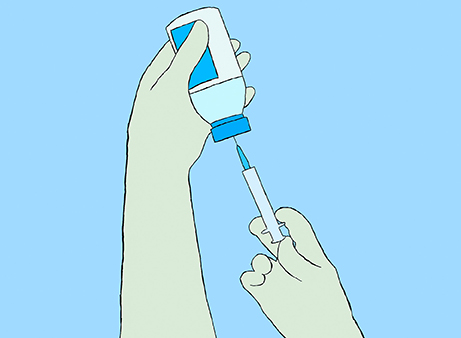Just as a great deal of the media’s medical attention was being taken up by the outbreaks of measles across the country, on Friday, May 3, the NC Department of Health and Human Services (NCDHHS) gave everyone in the state another medical threat to worry about – chronic viral hepatitis.
On Friday, NC Governor Roy Cooper and the NCDHHS rolled out a publicity campaign to promote hepatitis awareness across the state and to encourage state residents to get tested and vaccinated. The new push comes in the wake of a growing measles threat and a renewed emphasis by the medical and public health communities on the importance of vaccinations generally.
According to a press release sent out by the state on Friday, chronic viral hepatitis currently affects more than 230,000 North Carolinians – and the evidence suggests that many more people may have hepatitis and not know they have it until later when they start to exhibit symptoms.
In order to address the threat and raise awareness, Cooper has proclaimed May as “Hepatitis Awareness Month” and May 19 as Hepatitis Testing Day.
During Hepatitis Awareness Month, the NCDHHS is encouraging residents to learn the risks of the liver disease and to also get tested for hepatitis A, hepatitis B and hepatitis C.
According to state health officials, while each strain can produce similar symptoms, each has a different path of transmission.
State Health Director and DHHS Chief Medical Officer Elizabeth Tilson said this week that it’s essential that those people at high risk take action.
“The most important message for anyone who is at an elevated risk for any type of hepatitis is to get vaccinated to prevent infection,” Tilson stated in a press release Friday. “It is also important to get tested and seek treatment if you are infected. Hepatitis is preventable and manageable with the proper diagnosis and medical care. Getting vaccinated and tested could save your life.”
Cases of hepatitis in North Carolina have increased significantly over the past decade: Since 2009, there’s been roughly a 500 percent increase in reported cases of hepatitis C. Also, new cases of hepatitis B infections have doubled since 2013. And, nationally, there’s an ongoing outbreak of hepatitis A that’s been “linked to homelessness, sexual contact between men and intravenous drug use.”
While HIV, intravenous drug use and unsafe sex raise the risk of contracting hepatitis, there are also other factors to consider. According to state officials. A person’s age, ethnicity, medical history and lifestyle may contribute to his or her level of risk. People born from 1945-1965 – in other words, Baby Boomers – are five times more likely to be infected with hepatitis C due to a lack of screening and limited infection prevention strategies before 1992. The Centers for Disease Control and Prevention recommends that Baby Boomers receive a one-time only screening for hepatitis C, barring any additional risk factors. While there’s no vaccine for hepatitis C, fortunately there is a cure.
State health officials also point out that people living with type 1 or type 2 diabetes have higher rates of hepatitis B than the general population – “especially if they share diabetes-care equipment such as fingerstick devices, syringes or insulin pens.”
Hepatitis A, B and C are spread when blood from an infected person enters the body of someone who’s not infected, while hepatitis A can also be spread through food, water or objects that have been in contact with an infected person.
According to state health officials, people can help to prevent the spread of hepatitis by getting vaccinated for hepatitis A and B, practicing safe sex, never sharing medical supplies and sterilizing blood-contaminated equipment such as tattoo or piercing instruments.


I had chronic hepatitis b with fibrosis of the liver already present. I started Lamivudine (Epivir-HBV) treatment which reduced the viral load initially. After a couple of years the virus became resistant and i decided to try a more natural approach to treat the virus, so i started on HEPATITIS B Herbal formula treatment from Organic Herbal Clinic, this natural HBV treatment totally reversed my condition. I did another blood test after the 4 months treatment and tested negative to the virus. Go to Organic Herbal Clinic official web page organicherbalclinic . c o m. This treatment is a breakthrough for all HBV carriers.